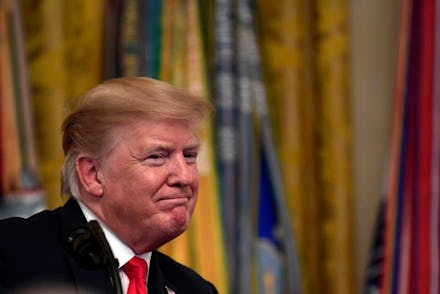Donald Trump says Hurricane Maria’s Puerto Rico death toll is a ploy to make him “look bad”

President Donald Trump on Thursday sought to call into question the death toll from Hurricane Maria in Puerto Rico, saying the death toll from the summer 2017 storm, which has been revised to nearly 3,000 people, was the work of Democrats looking to tarnish his record.
“3000 people did not die in the two hurricanes that hit Puerto Rico,” Trump tweeted Thursday morning. “When I left the Island, AFTER the storm had hit, they had anywhere from 6 to 18 deaths. As time went by it did not go up by much. Then, a long time later, they started to report really large numbers, like 3000.”
“This was done by the Democrats in order to make me look as bad as possible when I was successfully raising Billions of Dollars to help rebuild Puerto Rico,” Trump continued. “If a person died for any reason, like old age, just add them onto the list. Bad politics. I love Puerto Rico!”
Trump’s comments come as Hurricane Florence, now a category 2 storm, hurtles towards the Carolina coast, threatening millions in its path. In seeking to assure Americans that his government is prepared for the storm, Trump has also tried to defend his administration’s response to Hurricane Maria, calling it an “unsung success.”
“It was one of the best jobs ever done with respect to what this is all about,” Trump said Tuesday at a briefing, referring to the Hurricane Maria response.
Of course, the 2,975-person death toll from Hurricane Maria was not a Democratic ploy to hurt Trump. It was commissioned by Puerto Rico Governor Ricardo Rosselló, and was conducted by experts at George Washington University’s Milken Institute School of Public Health.
The initial low death count of 64 people only took into account those who died from “structural collapse, flying debris, floods and drownings.” The new report looks at how power outages and medical infrastructure also impacted lives and led to deaths on the stricken island.
“During our broader study, we found that many physicians were not oriented in the appropriate certification protocol,” according to the report from the researchers at GWU. “This translated into an inadequate indicator for monitoring mortality in the hurricane’s aftermath.”